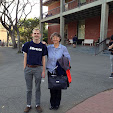It's March -- Developmental Disabilities Awareness Month. And, a time to focus on the causes of the nationwide crisis of Aging Adults with Intellectual and/or Developmental Disabilities Still Cared for by Senior-Age Parents. We must improve the gap between teen and adulthood; we need a cradel-to-aging system, and to create this, we must analyze where the gaps occur: [1] research with a goal of "curing" autism, and, [2] childhood special ed programs designed to "fix" behavior problems before adulthood. Unfortunately, many of those programs are geared toward so-called "high functioning ASD" children who "show promise" to someday pass for neuro-typical with relatively minor program effort. The grants-for-public schools, and the tuition for private schools are the same amount of money regardless of whether the students have "extreme autism" or are at what was formerly known as the "aspie" end of the ASD spectrum. Therefore, it's in the interest of schools and nonprofits to design programs that teach life-skills only to low-needs ("aspie") children, while the high-needs kids languish. Later, because the "high-staffing-needs" students were denied an opportunity to learn self-management skills, they are in turn abandoned by the adult programs because the inappropriate conduct has become habit. So, they stay with Mom until she dies. In the old days, Mom's death meant getting sent to the poorly supervised, overcrowded institutions where some of the low-paid staff did a mediocre job of caring for the adults. Well-intentioned pro-inclusion values drove the goal of closing those old institutions, but where are the replacements? Group home and SLS staff are still paid under the same old system: Regardless of whether the person they support just needs reminders or whether they require a hoyer lift to shower, the paycheck is generally minimum wage. Why take on more work for the same pay, ask the staff? So, adults are remaining with Mom until she dies, but without a replacement for her. With the exception of some adulthood-dedicated programs from the Department of Developmental Services (DDS) that many other states don't even have, along with the CA-DOR, government programs for adulthood itself receive barely a trickle funding compared to that provided to research and school programs. The resulting gaps are filled by struggling nonprofits. This sends a mentally abusive message to adults with ID/DD and their families that they're not good-enough, not worthy of investment, because their cognitive challenges proved too profound to have been "fixed" in childhood. Ever hear the playground bully-chant that goes, "You're too stupid to live"? In my youth as a teacher, I was the only one punishing the bullies. The other teachers ignored this hate-filled, abusive message, and ridiculed me. With such callousness, as high as the suicide rate is among people with disabilities, I'm surprised it's not even higher -- a testament to their courage and inner resolve. This is why I am a member of NAMI, and I recommend ID/DD families join, too. Did anyone survive school without some level of the "mental illness" that is post trauma stress defense? The system needs large-scale reform into a "cradle-to-aging" system in place with members of the K-12/"Special Ed" commissions (CAC; SELPA, etc) visiting the meetings of the Commission on Aging and Adult Services, ADRC, and related agencies, and visa versa. Another key role is played by nonprofits such as Parents Helping Parents, AASCEND, my own "newbie" agency DDFP-CA, where self-advocating adults with ID, ASD, or another type of DD, or families of adults with ID/DD can meet a trustworthy environment where they are free to express their frustrations with "the government" who has placed their housing, supports and other needs last on national and state budgetary priority lists for generations. My autistic son and I live in California's poorest county, but money is not as important as community commitment on the part of not only formally elected, hired, or appointed leaders, but every single resident. We are blessed because despite having a lower budget than everyone else, we have leadership willing to listen to the needs of struggling individuals and families, and troubleshoot to change systems so everyone has what is needed to not only survive, but to thrive. So, wherever you are in the U.S., visit your local county's meetings of the: [1] Commission on Aging and Adult Services; [2] Board of Supervisors [3] Family Support Group meetings [4] NAMI... And more. As always, if you are in California and you or a family member has received a diagnosis on "The Autism Spectrum" (ASD), seek help from the Regional Center that serves your county. Here's that link:
|

No comments:
Post a Comment
If you have a comment or question, you can write it here, or email me at marilew2005 @ gmail dot com. (No spam). Thanks!